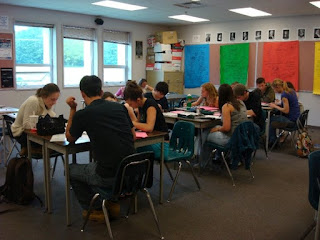Formative Assessment
 |
| Principles of Math 12 and Assessment for Learning |
One of my greatest passions in education, next to teaching mathematics, is Assessment for Learning. Understanding the difference between formative assessment and summative assessment was transformational to my teaching practice. I remember one of my colleagues insisting that there was a difference between the two, but I could not wrap my head around it until I spoke to another teacher from another district who professionally provoked me to question my practice. To both colleagues, many thank you’s. I spent almost five years revising my teaching practice to incorporate the values of Assessment for Learning and doing my best to provide feedback to my students without grading or judging them. On the one hand, my math classes seemed like ‘high stakes testing’ because I had very few items I collected for marks. On the other hand, students felt like they had a second chance and were more motivated to learn because the door was never closed. Using formative assessment in my math classes was a HUGE awakening for me. Not every counts for marks, but everything is important. I no longer had pages of marks to compute a final grade for a student, but I had no more than a dozen items and many observations to determine how a student was achieving in my math class. It was liberating and I felt like I was more focused on teaching and learning, not counting and evaluating. Inspired, I have given many workshops in the past year about Assessment for Learning and how to get started. I was reminded last week at the Pacific Institute for the Mathematics Sciences (PIMS) 2012 Conference on Changing the Culture that Formative Assessment continues to be a HOT TOPIC for mathematics educators in K-12 and higher education. The continuum of “everything counts” and “formative feedback” still exists. As much as I enjoyed the entire conference, the panel discussion on Formative Assessment was dynamic, inspirational, and tense. WOW. This session made it very clear to me that the assessment and evaluation of student learning is strongly held on the personal beliefs of the educator. A big aha… All that I know is, thank goodness for professional development sessions such as the PIMS 2012 Conference. It is a great opportunity to discuss with other practitioners about our practice, what’s important, and what’s not so important. Much enjoyed all of the speakers and what I have learned as a mathematics educator, graduate student, and educational consultant. All is possible and “all students crave feedback.”